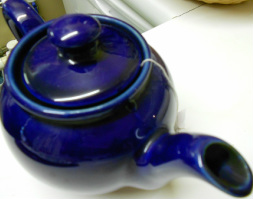
It's amazing what a good pot of tea can do. Perhaps that's why it's reputed to be the beverage of choice for the clergy. It acts as a convenor, gathering people around itself - 'Is it time for some tea?' It's like a sheepdog, holding us together as we drink our way through the pot, preventing us from going off in all directions. It gives us something to do with our hands, actions to carry out to fill in the pauses in conversation. It gives us space to stop and think, drawing out our thoughts and crystallising ideas whilst time almost stands still and more frantic concerns are put to one side.
This morning, Fr John and I shared a pot of tea. It's many months since we last met up: we're busy, and time had simply passed by. It was good, not so much to conduct business as to see where the conversation would take us.
We talked about various matters of common concern. We shared the difficulties we face from people who are troubled, unreasonable, and sometimes violent. We wondered what more we could do to work together across the ecumenical divide. We set a time to meet for lunch in a few weeks' time. We drained the teapot. More tea, Vicar?
And I was left with one particularly important thought.
The Kingdom of God, the Kingdom about which Jesus spoke and for which he worked, isn't about some future time when all our worries have evaporated and life is serene and unchallenging. Nor is it about spiritual heroics or the achievement of saintliness.
The Kingdom of God is revealed rather in the way we face life day by day: the things we find confusing, upsetting, demanding; the things which shake us to the core; the things we find dull and mundane; the things in which we fail; and of course, the things which exhilarate and uplift us. The Gospel is about approaching all these things with integrity and grace. Or to put it another way, the arena of God's work in the world and in our lives is the ordinary, and how we deal with the ordinary here and now is our own contribution to the Kingdom of God.
Some words of John Keble to ponder:
If on our daily course our mind
be set to hallow all we find,
new treasures still, of countless price,
God will provide for sacrifice.
The trivial round, the common task,
will furnish all we ought to ask:
room to deny ourselves; a road
to bring us daily nearer God.
This morning, Fr John and I shared a pot of tea. It's many months since we last met up: we're busy, and time had simply passed by. It was good, not so much to conduct business as to see where the conversation would take us.
We talked about various matters of common concern. We shared the difficulties we face from people who are troubled, unreasonable, and sometimes violent. We wondered what more we could do to work together across the ecumenical divide. We set a time to meet for lunch in a few weeks' time. We drained the teapot. More tea, Vicar?
And I was left with one particularly important thought.
The Kingdom of God, the Kingdom about which Jesus spoke and for which he worked, isn't about some future time when all our worries have evaporated and life is serene and unchallenging. Nor is it about spiritual heroics or the achievement of saintliness.
The Kingdom of God is revealed rather in the way we face life day by day: the things we find confusing, upsetting, demanding; the things which shake us to the core; the things we find dull and mundane; the things in which we fail; and of course, the things which exhilarate and uplift us. The Gospel is about approaching all these things with integrity and grace. Or to put it another way, the arena of God's work in the world and in our lives is the ordinary, and how we deal with the ordinary here and now is our own contribution to the Kingdom of God.
Some words of John Keble to ponder:
If on our daily course our mind
be set to hallow all we find,
new treasures still, of countless price,
God will provide for sacrifice.
The trivial round, the common task,
will furnish all we ought to ask:
room to deny ourselves; a road
to bring us daily nearer God.
 RSS Feed
RSS Feed